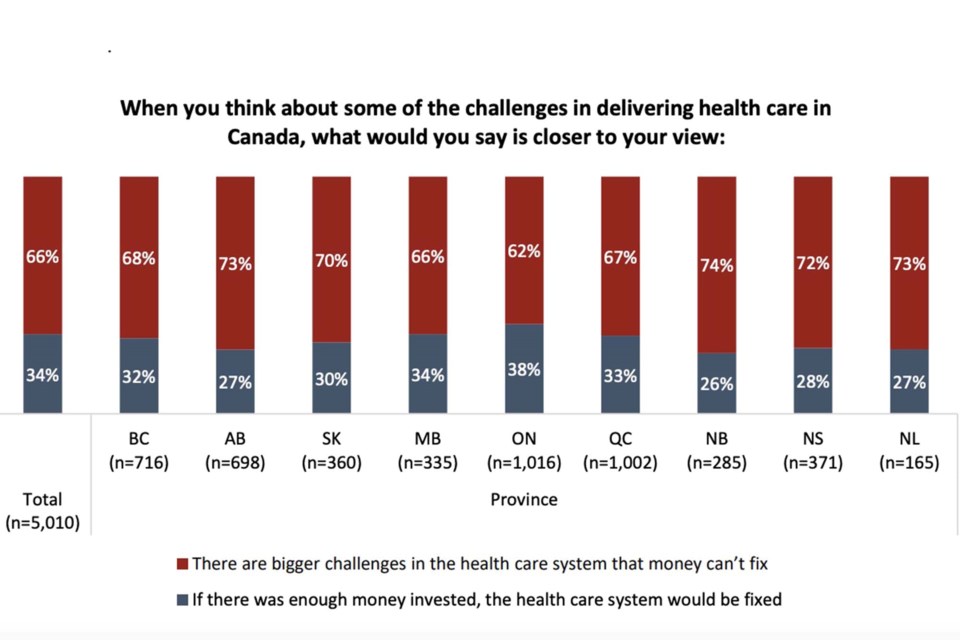A vast majority of Albertans believe there are problems in the Canadian health care system that can’t be fixed with money, according to a survey released recently.
On Aug. 17, the Angus Reid Institute, in partnership with the Canadian Medical Association, released a study on the quality of health care in Canada. It conducted the online survey of a random sample of 5,010 Canadian adults from Aug. 1-8.
A whopping 68 per cent of those polled believe health care has worsened over the last decade. That is a 26 per cent increase from the 42 per cent who felt the same in 2015.
The survey also found 66 per cent believe there are structural problems within the health care system.
The study asked Canadians whether they believe the “estimated $46.2 billion over the next decade” announced by the federal government and negotiated with the provinces to boost health care funding in each province would improve the health care system.
Alberta was one of the most pessimistic provinces, with 37 per cent of Albertans believing the funding would not lead to improvements, while country wide, only 31 per cent held that view.
However, the majority of Canadians polled believed the money would have marginal benefits at 51 per cent.
Of those polled, 73 per cent of Albertans believe issues in health care can’t be solved by money, while 27 per cent believe money could help fix the system.
Overall, 66 per cent of Canadians polled do not think money will solve the issues in the health care system.
According to data from the study, Alberta ranked third when it came to the percentage of those moderately satisfied with the performance of both the provincial and federal government when it comes to the health care system.
Of the 698 Albertans polled, 36 per cent where moderately satisfied with the performance of the provincial government, while 30 per cent of those polled were satisfied with the federal government.
Over a quarter of Albertans believe the provincial government is prioritizing health care enough, the highest rating of any province. Still, the vast majority of Albertans polled, 73 per cent, do not believe health care is enough of a priority.
Alberta was tied with Ontario for the province where respondents found it easiest to see a family doctor.
Data from the study showed 39 per cent of Albertans said they usually have to wait a few days to see a family doctor but could see a doctor sooner if needed, while 17 per cent said they could easily get in within a day or two, 27 per cent said it was difficult to see a family doctor with wait times of a week or more, and 16 per cent of Albertans said they did not have a family doctor.
The study asked participants about how they believe the doctor shortage in the country could be solved and the top response with 64 per cent of respondents polled, who did not work in health care, believed making it easier for foreign doctors to practise in Canada would ease the issue, while 41 per cent of health care workers thought the same.
“Make it easier for doctors to work in different provinces,” ranked second with 33 per cent of non-health care workers respondents choosing that issue to focus on, and 28 per cent of health care workers voting for the same.
The second-top solution on the doctor shortage for health care workers at 35 per cent was for there to be more universities and college programs.
Between the provinces, there were agreements on priorities that should be addressed. The priorities included ensuring emergency departments remain open and are adequately staffed improvements to how quickly patients are treated; reducing burnout, stress, and mental health issues of health care workers; reducing wait lists for a family doctor; and reducing surgery wait times.
The study also asked participants about privatization.
“Three-in-10 Canadians (31 per cent) say that more private care would improve health care, while 44 per cent say it would worsen the situation,” the study stated.
The study noted Canadians who are unsure about a privatization increased seven points since last year, “with a subsequent drop in those holding a negative view.”
Canadians are also quite pessimistic the health care situation in Canada will improve in the next two years.
Overall, 49 per cent of Canadians are more pessimistic than optimistic there will be improvements over the next two years, while 19 per cent are completely pessimistic there will be any improvement.
Only a quarter of Canadians felt optimistic about improvements to the health care system in the next two years.
The full study can be found at https://angusreid.org/wp-content/uploads/2023/08/2023.08.17_CMA.pdf




